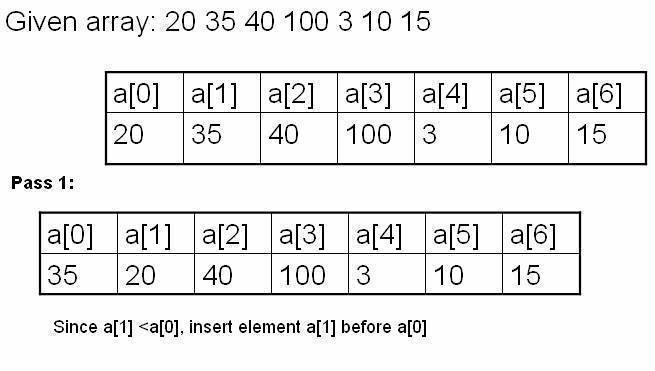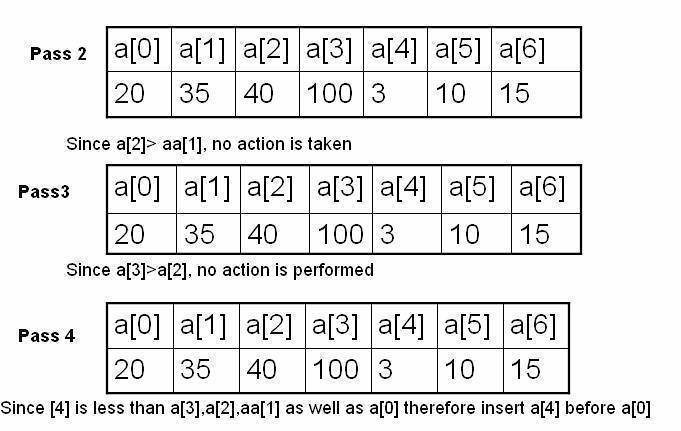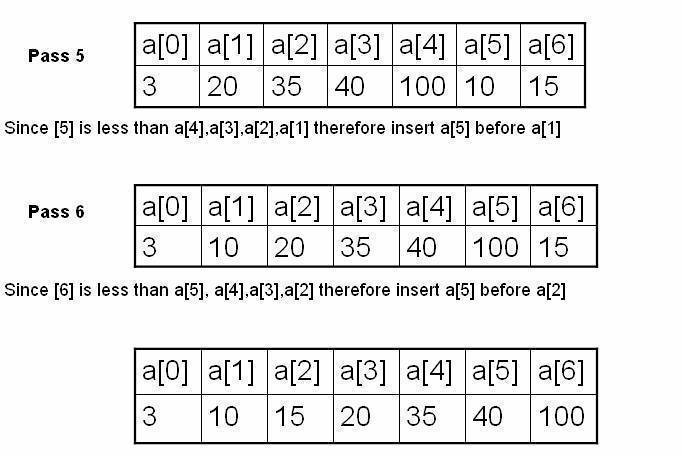Insertion Sort
This algorithm is very popular with bridge players when they sort their cards. In this procedure, we pick up a particular value and then insert it at the appropriate place in the sorted sub list.
This algorithm requires n-1 passes.
Pass1: a[1] is inserted either before or after a[0] so that a[0] and a[1] are sorted.
Pass2: a[2] is inserted either before a[0] or between a[0] and a[1] or after a[1] so that the elements a[0], a[1], a[2] are sorted.
Pass3: a[3] is inserted either before a[0] or between a[0] and a[1] or between a[1] and a[2] or after a[2] so that the elements a[0], a[1], a[2], a[3] are sorted.
Pass k: a[k] is inserted in its proper place in the sorted sub array a[0], a[1], a[2],…a[k-1] so that the elements a[0], a[1], a[2],…a[k-1],a[k] are sorted.
Pass n-1:a[n-1] is inserted in its proper place in the sorted sub array a[0], a[1], a[2],…a[n-2] so that the elements a[0], a[1], a[2],…a[n-1] are sorted.



Analysis of Insertion Sort
The worst-case performance occurs when the elements of the input array are in descending order.
In the worst-case, the first pass will require one comparison, the second pass will require 2 comparisons, and so on until the last pass which will require (n-1) comparisons. In general, the kth pass will require k-1 comparisons.
Therefore the total number of comparisons is:
F(n)=1+2+3+…..+(n-k)+….+(n-3)+(n-2)+(n-1)
=n(n-1)/2
=O(n2)
Algorithm
insertionsort(a,n)
Here a is a linear array with n elements. This algorithm sorts the elements in ascending order. It uses a temporary variable temp to facilitate the exchange of two values and variables j and k are used as loop control variables.
begin
for k=1 to (n-1) by 1 do
set temp=a[k]
set a[j]=k-1
while((temp<a[j]) and j>=0) do
set a[j+1]=a[j]
set j=j-1
endwhile
set a[j+1]=temp
endfor
end
Complete Program
.cf { font-family: Lucida Console; font-size: 9pt; color: black; background: white; } .cl { margin: 0px; } .cb1 { color: green; } .cb2 { color: blue; } .cb3 { color: maroon; }
/**
* Insertion sort
* http://www.byteguide.com
*/
#include <stdio.h>
void insertionsort(int a[], int n)
{
int i, k, y;
for (k=1; k<n; k++)
{
y = a[k];
for (i=k-1; i>=0 && y<a[i]; i--)
a[i+1] = a[i];
a[i+1] = y;
}
}
int main()
{
int a[50], n, i;
printf("How many elements do you want to create the array with?"
"max(50): ");
scanf("%d", &n);
fflush(stdout);
puts("Enter the array elements");
for (i=0; i<n; i++)
scanf("%d", &a[i]);
insertionsort(a, n);
puts("--------Sorted Array--------");
for (i=0; i<n; i++)
printf("%d ", a[i]);
printf("n");
return 0;
}
Output
How many elements do you want to create the array with?(max 50): 6
Enter the array elements
3
67
85
89
56
44
——–Sorted Array——–
3
44
56
67
85
89


Comments - No Responses to “Insertion Sort”
Sorry but comments are closed at this time.